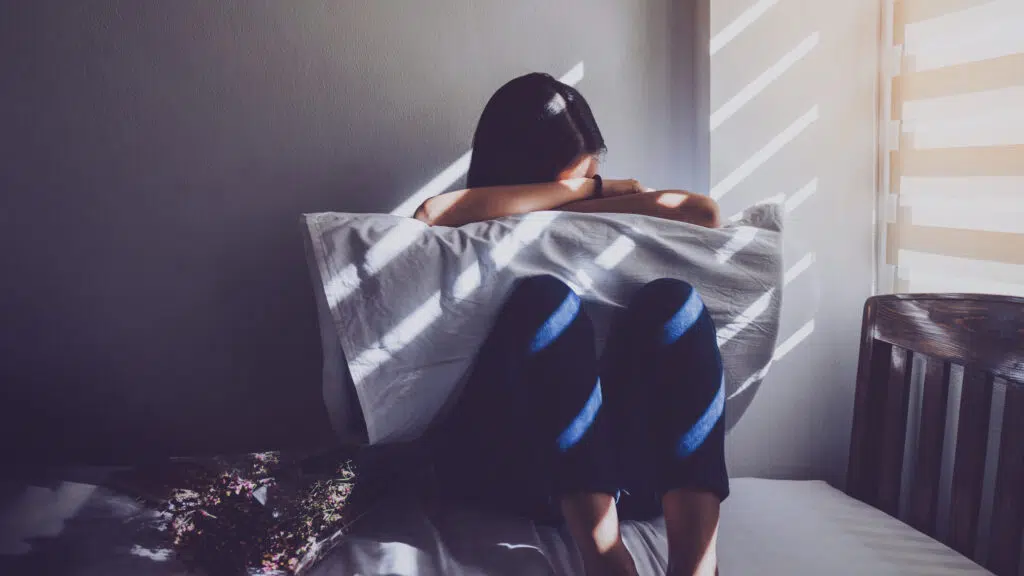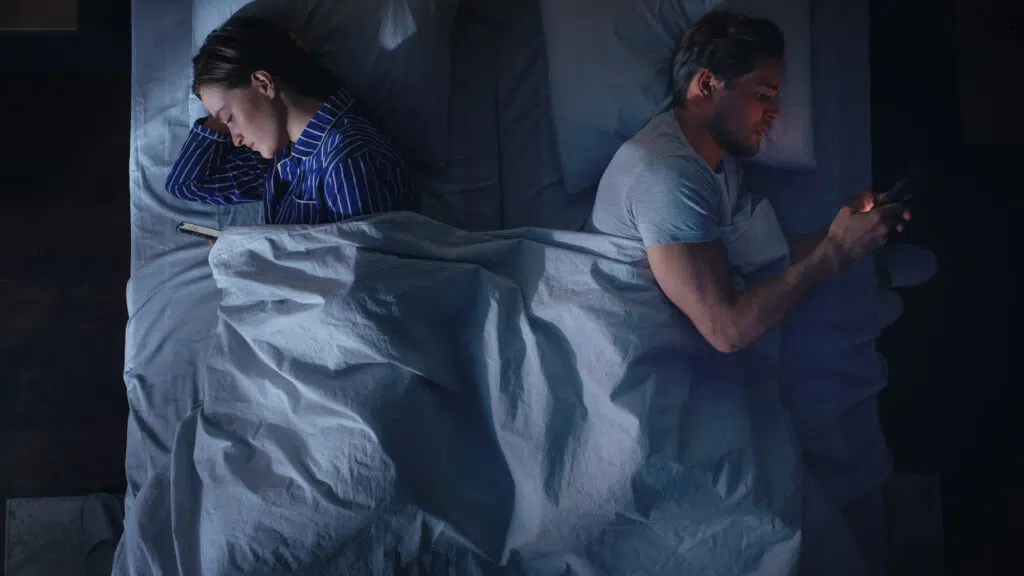What Is The Link Between Mental Health and Sleep?

An estimated 50 to 70 million Americans have chronic or ongoing sleep disorders. But how does sleep affect your mental health? Is interrupted sleep better than no sleep at all? And how many hours of sleep do you need for mental health? In this article, we answer your questions and explore the connection between mental health and sleep so you can start racking up more zzzs.
How Does Sleep Affect Your Mental Health?
Or should the question be: how does your mental health affect your sleep?
The extent to which sleep causes mental health issues isn’t clear. But what we do know, thanks to a growing body of research, is that good sleep, alongside nutrition and movement, is fundamental for overall health and well-being.
Author, scientist, and Professor of Neuroscience and Psychology at the University of California, Berkeley, Dr. Matthew Walker, says: “Without sleep, there is low energy and disease. With sleep, there is vitality and health.“
Sleep and mental health are closely connected. Anxiety, depression, panic attacks, and seasonal affective disorder (SAD), just to name a few, can affect sleep. Anxious thoughts running through your head can make it difficult to nod off. Panic attacks can wake you up in the middle of the night. Sleep disturbances can be one of the symptoms of depression.
At the same time, studies suggest that poor sleep can make it difficult to make decisions, control your emotions, and cope with change. Sleep deficiency has also been linked to depression and risk-taking behavior.
In a major review of 65 randomized controlled trials consisting of over 8,000 people, researchers found that improving sleep quality leads to a reduction in symptoms of anxiety, depression, and stress.
Various studies suggest a bidirectional relationship between sleep and mental health, meaning each can contribute to the development and is also a consequence of the other. For instance, depression can contribute to sleep disturbances and vice versa.
Just the thought of being anxious about being unable to sleep can make it feel impossible to get to sleep. Anxiety is often connected with sleep problems, but sleep deprivation also appears to increase anxiety symptoms, creating a vicious cycle. Studies report an association between insomnia, depression, and anxiety.
As difficult as it can feel at times, prioritizing good sleep and addressing sleep problems is an important part of supporting mental well-being.
What Are The Side Effects Of Lack Of Sleep?
Most people know what it feels like when you don’t get enough sleep. Side effects of a lack of sleep include:
- Difficulty concentrating
- Memory lapses and forgetfulness
- Increased irritability
- Mood swings
- Difficulty performing tasks effectively, impacting productivity, reaction time, and alertness
- Weakened immune system
- Decreased coordination
- Increased risk of accidents and injuries
It’s not quite as straightforward to repay sleep debt or a sleep deficit by catching up one night at the weekend. Sleep debt can build over time, and it’s easy to put it off. Even if you start to feel normal after not sleeping enough, your neurocognitive performance may still be lower than your baseline. That’s why it’s so important to get plenty of sleep regularly rather than occasionally.
There are so many reasons why people experience sleep problems, like:
- Stress and Anxiety: Worries, stress, and anxiety can impact sleep.
- Poor Sleep Hygiene: Irregular sleep schedules, inconsistent bedtime routines, and a lack of a conducive sleep environment can contribute to sleep difficulties.
- Caffeine and Stimulant Intake: Consuming caffeinated drinks or other stimulants, particularly close to bedtime, can interfere with the ability to fall asleep.
- Irregular Work Hours: Shift work and irregular working hours can disrupt the body’s natural circadian rhythm, making establishing a consistent sleep pattern challenging.
- Medical Conditions: Conditions, such as chronic pain and sleep apnea, can interfere with sleep quality.
- Medications: Some medications may have side effects, affecting sleep patterns.
- Lack of Exercise: Physical activity can improve sleep duration and quality.
- Environmental Factors: Noise, a snoring partner, light, or an uncomfortable sleeping environment can disrupt sleep.
What Is Considered Sleep Deprivation?
Sleep deprivation is not getting enough sleep in either quality or quantity. Short-term sleep deprivation can look like missing one to hours of sleep in one or a few nights. Chronic sleep deprivation is when you consistently get less sleep over weeks, months, or years.
Disrupted sleep, where you wake up at night, can also cause sleep deprivation by impacting the quality of sleep; even if you get enough sleep, you still don’t feel rested.
Can Lack Of Sleep Cause Anxiety And Depression?
A lack of sleep can contribute to anxiety and depression, but it’s a two-way street. Poor sleep may worsen anxiety and depression symptoms, but anxiety and depression are also associated with sleep problems. Anxiety, depression, and sleep are connected. Sleep deprivation may trigger certain mental health symptoms, but the exact underlying cause of this isn’t always clear.
Does Depression Make It Hard To Sleep?
Sleep issues are associated with depression, but the link between depression and sleep is complex. Research shows that about three-quarters of depressed patients have insomnia symptoms. Depression can cause sleep problems, but on the flip side, people with insomnia also have a higher risk of developing depression.
What Can I Do To Improve My Sleep?
Sleep hygiene tips for better mental health center around optimizing sleep hygiene so that you can consistently hit those 7-9 hours of recommended sleep every night:
- Aim for a regular and consistent sleep schedule
- Try to relax before bedtime (read a book, have a bath)
- Make sure your bedroom is quiet, dark, and cool
- Cut back on caffeine and alcohol
- Exercise regularly
- Manage stress
Investing time in your sleep hygiene is an ongoing process that takes time. Optimizing your sleep schedule and getting quality sleep supports emotional, physical, and mental well-being.
Here are some apps for sleep and anxiety that could be useful for kickstarting new habits:
- Calm – offers meditation for a quick break or longer sessions.
- Headspace – provides mindfulness and resources to help build resilience, reduce stress, and sleep better.
If you’re experiencing consistent sleep problems, it’s essential to speak to your doctor, who can rule out any underlying condition that could be affecting your sleep. Different types of professionals specialize in sleep problems:
- Sleep medicine physician: This is the most general type of sleep specialist, trained in diagnosing and treating various sleep disorders.
- Pulmonologist: Pulmonologists specialize in respiratory issues and may focus on breathing-related sleep disorders, like sleep apnea.
- Psychiatrist: A mental health professional specializing in psychiatry who can address the mental health aspects of sleep disorders.
- Psychologist: A psychologist specializing in sleep may use behavioral and cognitive therapies to address various sleep-related issues.
- Therapist: Mental health therapist or counselor with expertise in sleep disorders, providing counseling and behavioral interventions.
How To Find A Sleep Therapist Near Me
A sleep therapist can help you improve sleep by using various therapeutic approaches and techniques tailored to address specific sleep-related challenges. Some ways Thriving Center of Psych can help include:
- Customized treatment plan
- Assessment and diagnosis
- Cognitive Behavioral Therapy for Insomnia (CBT-I)
- Stress reduction techniques
- Sleep hygiene education
- Medication management
A sleep therapist addresses both psychological and behavioral aspects of sleep to empower individuals to overcome sleep challenges and achieve more restful sleep. The specific treatment approach will be tailored to your needs, sleep problems, and unique situations.
Start your journey today to better sleep. Book an appointment with our expert sleep therapists at Thriving Center of Psych. We have conveniently located offices in SoHo and Midtown, NYC, San Francisco, LA, CA, and throughout the country.

Sustaining Love: What to Do When the Honeymoon Phase Fades
There’s nothing quite like that initial attraction and spark where you just can’t get enough of your partner. But as the months and years roll on, it’s normal for relationships to transition through stages, and dynamics can shift.

All a Bad Dream? 1 in 4 Think Their Nightmares Predicted the Future
Americans have a lot on their minds. From navigating daily stress due to work or mental health to grappling with bigger widespread issues like politics, climate change, or crime, it’s safe to say there’s a lot to think about daily. For many, stressors aren’t only encroaching on their minds during waking hours, but also when they try to sleep in the form of nightmares, or bad dreams.

Psychological Challenges with Remote Working
While we can meet our loved ones in person without masks, the pandemic brought some changes that have stuck. Remote working has transformed the workforce. Some companies have chosen a fully remote approach, while others are welcoming their employees back to the office full-time.

Survey: 72% of Americans are Stressing About the Upcoming Presidential Election
Political viewpoints in the U.S. have always been contentious, but is the impact of politics in the United States making it difficult for people to live their everyday lives? With some anticipating another brutal and long campaign season ahead of the upcoming 2024 presidential election, nearly half of Americans say politics is negatively impacting their mental health.




